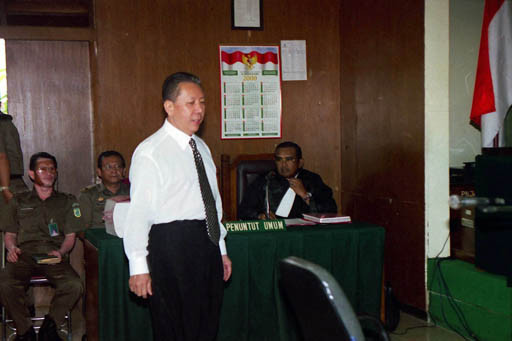Popular Reads
Top Results
Can't find what you're looking for?
View all search resultsPopular Reads
Top Results
Can't find what you're looking for?
View all search resultsGovt to revive team to hunt graft fugitives
Change text size
Gift Premium Articles
to Anyone
T
he government is stepping up its efforts to catch graft fugitives with a plan to revive an integrated team to hunt them down, after years of inaction.
Coordinating Political, Legal and Security Affairs Minister Mahfud MD said that his office would lead the team with members coming from the National Police, the Attorney General’s Office (AGO), the Home Ministry and the Law and Human Rights Ministry.
Mahfud said each participating institution would play specific roles in the team: the police and the AGO will investigate and locate the whereabouts of graft fugitives, the Home Ministry will analyze civil registry records and the Law and Human Rights Ministry will provide immigration records. The team will also seize fugitives’ illegal assets to reimburse state losses.
“We used to have a similar team and now we are going to revive it. We have prepared a presidential instruction [inpres] as a legal guideline for the reactivation,” Mahfud said in a statement on Tuesday.
The recent failure of authorities to detect the arrival of longtime fugitive and graft convict Djoko Tjandra in the country appears to have given urgency to the establishment of the team.
Djoko fled to Papua New Guinea in 2009, a day before his conviction for involvement in the high-profile Bank Bali graft case.
Last month, Indonesian authorities learned that Djoko had reentered Indonesia only after the AGO, which investigated his case in the past and has been hunting for him since his escape, discovered he had filed an appeal for a review of his case.
His whereabouts remain unclear to date, and the AGO and the Law and Human Rights Ministry, which oversees immigration offices, have played the blame game regarding responsibility for the failure to find him.
“We are going to hunt and arrest Djoko using this [new] team. We expect it to be able to capture him immediately,” Mahfud said.
The membership of the team will exclude the Corruption Eradication Commission (KPK), which, according to Mahfud, handles a different type of corruption case and has its own team to investigate fugitives. But Mahfud promised that the team “would not take over KPK’s work”.
The KPK was quick to question the effectiveness of the new team in hunting down graft fugitives, citing failures by the previous team to capture its targets during 12 years of operation.
The previous team was established in 2004 after then president Soesilo Bambang Yudhoyono issued an inpres on the acceleration of corruption eradication. It was followed up by the issuance of a decree on the team’s establishment by then coordinating security affairs minister Widodo Adi Sutjipto.
During its first three years of operation, the team was headed by an assistant attorney general for special crimes. A deputy attorney general took over the leadership in 2007, and the team has been led by deputies since then.
The team has been in hiatus since its then leader Andhi Nirwanto resigned from his position as deputy attorney general in 2016. Former coordinating security affairs minister Wiranto did not renew the decree for the team, which also expired in the same year.
The team was known for its poor performance, with the House of Representatives calling attention to it in 2009.
Antigraft watchdog Indonesia Corruption Watch (ICW) recorded that the team only managed to arrest four out of 16 targets between 2004 and 2012.
In its final year in 2016, the team nabbed graft fugitive Samadikun Hartono -- who was guilty of embezzling Bank Indonesia Liquidity Support (BLBI) funds -- in China. But it also said it still needed to track down 28 other fugitives.
“Due to its lackluster performance in the past, I don’t see the point of reviving the team,” KPK commissioner Nawawi Pomolango told The Jakarta Post.
He said that law enforcement agencies and the government should improve their coordination in tracking down graft fugitives instead of reactivating the team.
The ICW's Wana Alamsyah said the plan to revive the team was unnecessary, while Wawan Suyatmiko of Transparency International Indonesia said it would only add more layers to the already ineffective bureaucracy and cause extra state spending.
“I think the government and law enforcement agencies should instead improve their information exchange when chasing graft fugitives,” Wawan said.
Law and Human Rights Minister Yasonna Laoly said the public should wait to see how the team would perform its duty before criticizing it.










